Thinking about making the move to Ethiopia? The idea might sound a bit off the beaten path for most Americans, but those who've taken the plunge often find it tremendously rewarding. Ethiopia, with its rich culture, ancient history, and stunning landscapes, offers a unique blend of traditional and modern living.
This guide is built to offer you practical advice and a real-world inside look into what it takes for an American to relocate to Ethiopia. From understanding visa requirements to finding a place to live, and from navigating the local job market to adapting to cultural nuances, we’ve got you covered. Whether you're eyeing a career shift or simply looking for a change of scenery, here’s a comprehensive breakdown to help you navigate your way to making Ethiopia your new home.
- Visa and Documentation
- Cost of Living
- Finding Accommodation
- Cultural Adaptation
- Employment Opportunities
Visa and Documentation
Securing a visa is one of the pivotal steps to move to Ethiopia. For Americans, acquiring a visa to enter Ethiopia requires some planning but is fairly straightforward. First, you'll need to decide the purpose of your visit—whether it's for work, travel, or study. This determines the type of visa you'll need. The most commonly obtained visa for visitors is the Tourist Visa, which you can conveniently apply for online or upon arrival at Bole International Airport in Addis Ababa. However, if you're moving for work, you'll need a Work Visa, which involves additional steps like securing employment in Ethiopia beforehand.
To apply for a Tourist Visa online, visit the official Ethiopian eVisa website. You'll need to fill out a form, attach a passport-size photo, and upload a scanned copy of your passport, which should be valid for at least six months from your date of entry. Pay the fee—around $50 to $70, depending on your length of stay—and you'll usually receive confirmation within three business days. A Tourist Visa generally allows you to stay for up to 90 days.
If you're coming for employment, the process is more intricate but manageable. First, secure a job offer from a company in Ethiopia. Your employer will then sponsor your Work Visa application. This requires additional documentation, such as a letter of employment, a copy of your contract, and sometimes a health certificate. Remember, your employer in Ethiopia should handle the bulk of this paperwork. You may also be asked to provide academic qualifications or proof of work experience, depending on the role.
For those planning to stay long-term, consider applying for a Residence Permit after entering Ethiopia. To do this, visit the Main Department for Immigration and Nationality Affairs in Addis Ababa within 30 days of your arrival. You'll need your passport, visa, employment contract, and a letter of support from your employer. Residence Permits are typically valid for one year and must be renewed annually. This permit will make it easier to open bank accounts, sign leases, and generally navigate life in Ethiopia.
One important document to keep handy is your Yellow Fever vaccination certificate. Ethiopia mandates this for all travelers coming from countries with risk of Yellow Fever transmission, including the United States. Failing to present this can lead to delays or denial of entry at the airport. Another important consideration is to check the expiration dates of all your documents, as you don't want to be caught off guard with expired documentation, especially in a foreign country.
Last but not least, always make copies of all your documents—passport, visa, vaccination certificates, and insurance details. Have both physical and digital copies stored in accessible locations. This adds an extra layer of security and ensures that you won't be entirely helpless if you lose any of your original documents. Moving across the globe is a significant step, but having all your documentation in order can make the transition much smoother.
Cost of Living
Living in Ethiopia can be surprisingly affordable, especially if you are moving from an expensive U.S. city. The cost of living varies between urban and rural areas, but even in Addis Ababa, the capital, you'll find that your money stretches further than it does back home. Many expats report that day-to-day expenses, from groceries to transportation, are much lower than what they're used to.
When considering accommodation, rental prices in Addis Ababa range widely depending on the neighborhood. In more upscale areas such as Bole and Old Airport, you might pay around $1,500 per month for a modern, fully-furnished apartment. In less central neighborhoods, the same type of apartment can cost you around $600. Opting for local-style housing can drive costs down even further. Utilities, like electricity, water, and internet, are relatively cheap, often costing less than $100 per month in total.
Groceries in Ethiopia are also quite affordable, especially if you buy local products. Markets overflow with fresh fruits, vegetables, and meats, often at a fraction of the cost you'd pay in the U.S. Imported goods, however, can be more expensive, given the extra shipping and import fees. It's a great opportunity to immerse yourself in local cuisine and produce. For dining out, a meal at an average restaurant will cost around $5-10, while an upscale dining experience might set you back $20-40.
According to Numbeo, "The cost of living in Ethiopia is, on average, 60% lower than in the United States."
Transportation costs are another area where you can save. Public transportation, primarily in the form of minibusses and the Addis Ababa Light Rail, is very economical. Rides typically cost just a few cents. If you prefer more convenience, ride-hailing services such as RIDE and ZayRide are available, with typical trips across the city costing $2-5. Owning a car is more expensive, mainly due to high import taxes on vehicles. Many expats find it cheaper and easier to use public transport or taxis.
Healthcare and Education
Healthcare is another critical factor to consider. Private clinics and hospitals provide high-quality services at reasonable prices. Health insurance is recommended and can be obtained for a modest monthly fee. If you have any specific medical needs, it's good to research the availability of those services in the area you're moving to. Prescription medications are generally available, though brands might differ from those you're used to.
If you are moving with family, education costs might be a concern. International schools in Addis Ababa offer curricula in English and often follow American or British standards. Tuition fees can be quite high, ranging from $5,000 to $25,000 per year. However, there are more affordable local options, especially if you’re comfortable with your children learning in Amharic.
The cost of living in Ethiopia for an American can be quite manageable, even allowing for a higher standard of living than back home. It offers a great opportunity to experience a new culture without breaking the bank.
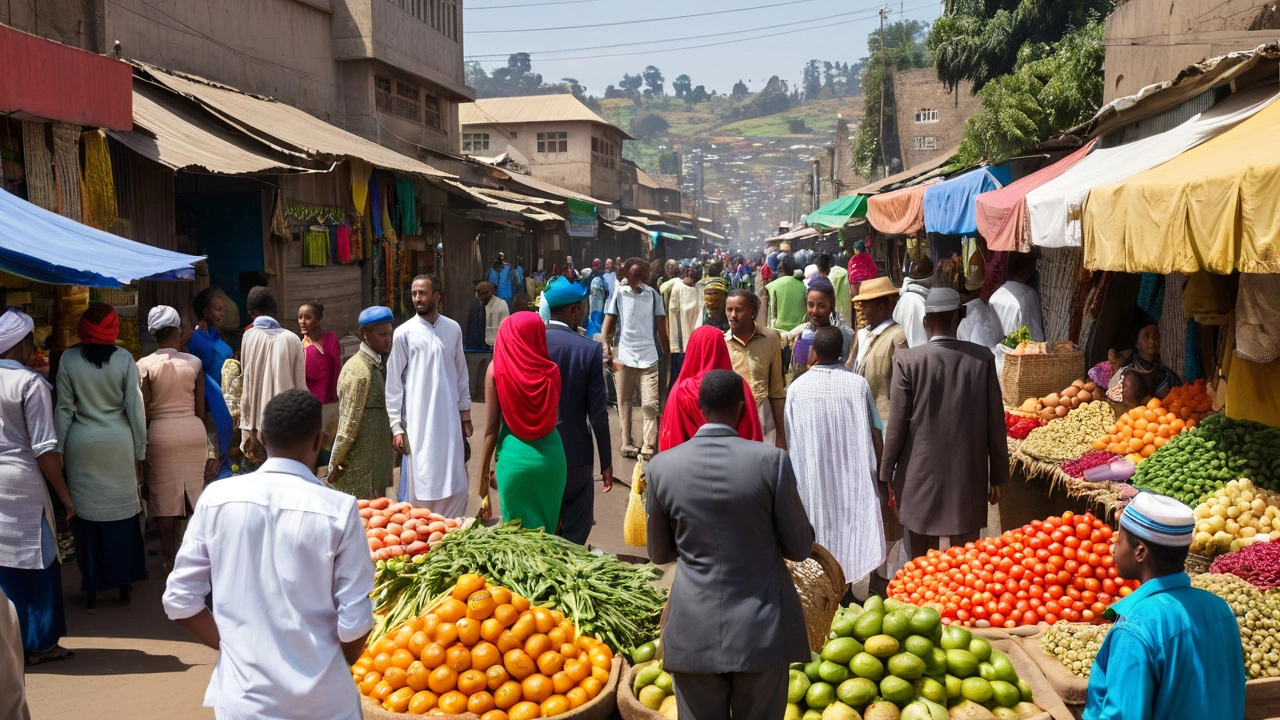
Finding Accommodation
One of the first things you'll need to tackle when moving to Ethiopia is finding a place to live. It might seem daunting at first, but with a bit of research and patience, you’ll discover that there are plenty of options ranging from high-end apartments to more modest homes. Generally speaking, Addis Ababa, the capital city, is where most expatriates choose to live because it has the most amenities and is the heart of business and culture in the country.
In Addis Ababa, neighborhoods like Bole, Kazanchis, and Old Airport are popular among expats. Bole is bustling and offers plenty of shopping, restaurants, and nightlife. On the other hand, neighborhoods like Old Airport are quieter and more family-friendly. Apartments in these areas can range from $500 to $2000 per month, depending on size and amenities. As a reference, a modern two-bedroom apartment in Bole could cost around $800 a month.
Leasing and Renting
When it comes to leasing, it's important to note that rental agreements in Ethiopia typically last for a year, and it's customary to pay a few months' rent upfront. Make sure to negotiate the terms of your lease carefully and involve a trusted local if needed. Sometimes, landlords may ask for a year’s rent in advance, so be prepared for that possibility as well. The good news is rental prices can sometimes be negotiated down, especially if you’re committing to a longer lease.
“My experience in finding a place to live here in Addis Ababa was pleasantly surprising. The people are accommodating, and with a bit of patience, I found a beautiful home that fits my budget perfectly.” — John, an American expat living in Ethiopia.
Real Estate Agents and Online Listings
Utilizing real estate agents can significantly simplify your search for housing in Ethiopia. Agents are familiar with the local market and can provide you with numerous options based on your needs. Websites like Expat.com and Qefira are useful for checking online listings before your arrival. Many properties listed online include photos and contact information for agents or landlords, making the initial search more accessible.
Understanding Local Norms
When renting in Ethiopia, it’s also essential to understand local norms and expectations. Utilities such as water, electricity, and internet may not be included in your rent, so ask for clarification. In some places, power outages can be frequent, so it's wise to have backup solutions like generators or solar panels in place. Additionally, water can sometimes be rationed, so knowing the schedule will help you manage daily activities better.
Security and Safety
Security is another aspect to consider when choosing accommodation. Look for properties with good security measures such as gated communities, security guards, and surveillance systems. In many expat-friendly neighborhoods, these features are standard and offer peace of mind. Engaging with the local community and getting advice from fellow expatriates can also help in finding safer and more comfortable living options.
Moving to a new country is a significant change, but finding the right home can make all the difference. With the right approach and understanding of the local market, securing accommodation in Ethiopia can be a smooth process, allowing you to enjoy all that this fascinating country has to offer.
Cultural Adaptation
Adapting to the cultural landscape of Ethiopia can be one of the most intriguing and enriching parts of moving to this East African nation. The first thing you'll notice is the incredible diversity; Ethiopia is home to over 80 different ethnic groups, each with its unique traditions, languages, and ways of life. Amharic is the official language, but don't be surprised if you hear a tapestry of tongues as you move through different areas. Learning even a few phrases in Amharic or Oromiffa can go a long way in making connections.
One of the most cherished traditions in Ethiopia is the coffee ceremony. Coffee isn’t just a drink here—it’s a ritual, a sign of hospitality. You might be invited to a neighbor’s or friend’s home for a coffee ceremony, which can take several hours. Savor the moment; this is not just about caffeine but about community bonding. The ceremony is a three-step process where coffee beans are roasted, ground, and then brewed in front of you. It offers a great opportunity to get to know locals and immerse yourself in the culture.
Religion plays a significant role in the everyday lives of Ethiopians. The country is predominantly Christian, with a large Muslim population as well. If you're in cities like Addis Ababa or Bahir Dar, you're likely to come across beautiful Orthodox churches adorned with colorful murals. Celebration of religious events like Meskel and Timkat could provide a deeper understanding of Ethiopian traditions and are visually stunning experiences.
Understanding social etiquette is also crucial. Ethiopia has a more conservative social fabric compared to the Western world. Dressing modestly is recommended, especially when visiting religious sites. Public displays of affection are generally frowned upon, so it’s best to be mindful of your behavior in public spaces. Punctuality is another aspect to consider; Ethiopians have a more relaxed approach to time, often referred to as "Ethiopian time." This flexibility can be both a delightful change and a minor culture shock.
Food is another great gateway to understanding Ethiopian culture. Staple dishes like injera and doro wat will soon become familiar tastes. Eating is often communal and encourages the sharing of a large platter with multiple dishes. If you're invited to an Ethiopian home for a meal, accept it enthusiastically. It's considered impolite to refuse such invitations. Be prepared to eat with your hands, as traditional Ethiopian meals are served without utensils.
The work culture in Ethiopia can also differ significantly from the United States. Hierarchical structures are often more pronounced, and building personal relationships is essential for professional success. Face-to-face interactions are highly valued, so you’ll spend more time in meetings than you might be used to. Networking and community involvement can afford you significant advantages in navigating the business landscape.
“It takes a village to raise a child, and in Ethiopia, community is everything,” says Lucy Yilma, an expert in Ethiopian cultural studies. “Understanding this communal mindset is crucial for anyone looking to integrate smoothly into Ethiopian society.”
Lastly, safety and adapting to a new way of life are valid concerns. Ethiopia has many safe areas, but like any country, it has places you should avoid. Learning about these areas and adopting local safety practices will help you enjoy your new environment more freely. While crime rates are generally lower than many Western countries, petty theft can be an issue, especially in crowded places.
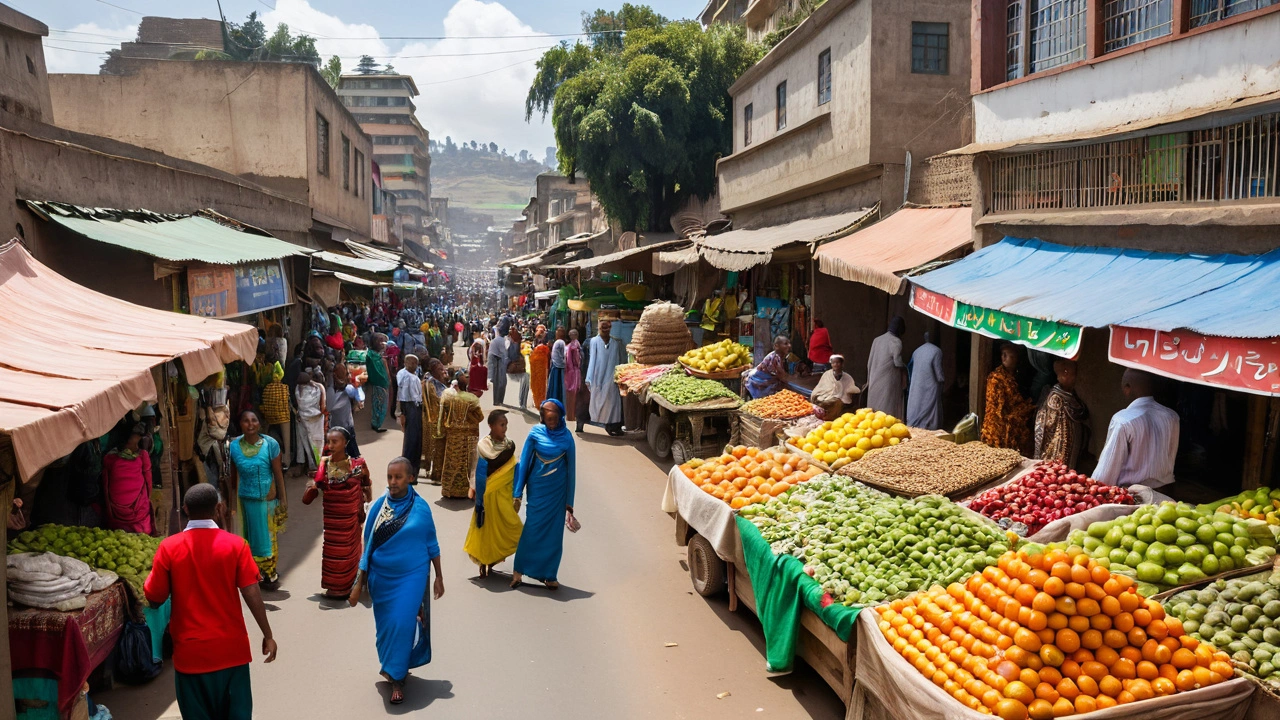
Employment Opportunities
When moving to Ethiopia, one major aspect you'll need to consider is employment. Finding a job in a new country can seem challenging, but with the right information, you can navigate the process more easily. Ethiopia's economy has been growing, and there are several sectors where expatriates, especially Americans, can find opportunities.
One of the main industries where Americans might find jobs is in education. English teachers are in demand, particularly with the increasing emphasis on English proficiency in schools and universities. Many international schools as well as local institutions seek qualified native English speakers. You might also find opportunities in international organizations or NGOs, which often require the skills and experience that expatriates can provide.
Another area where there might be opportunities is in the technology and telecommunications sector. Ethiopia has been working to expand its digital infrastructure, which means there are roles for tech professionals. Companies might be looking for expertise in software development, network engineering, or IT project management. The country's bold plan to create tech hubs offers a glimpse into the future demand for tech-savvy workers.
Agriculture also remains a cornerstone of Ethiopia's economy. With vast farming lands and a range of crops, there are opportunities for those with expertise in agricultural science, agribusiness, and sustainable farming practices. Businesses and research institutions may hire expatriates to implement new technologies and improve productivity. There's room to leverage modern techniques in a country where much of the farming still relies on traditional methods.
The hospitality and tourism industries are also thriving. Ethiopia's rich culture and history attract tourists from all over the world. This results in a need for professionals in hotel management, restaurant services, and tour operations. Americans with expertise in marketing, customer service, and hospitality management could find rewarding positions in these sectors. Ethio-American tourism ventures are growing, promoting unique travel experiences that combine elements from both cultures.
For those with entrepreneurial spirits, starting a business in Ethiopia could be a viable option. The government has been working to improve the business environment, offering incentives and support for new ventures. Key areas with potential include eco-tourism, agritech, and renewable energy. Being culturally sensitive and understanding local business practices is crucial for success. Networking with other expatriates and local business owners can provide valuable insights.
An interesting point to note is the presence of a large number of international organizations and diplomatic missions in Addis Ababa, the capital city. Known as the diplomatic capital of Africa, Addis Ababa hosts the African Union and various United Nations offices. This presence creates numerous job openings for expatriates in administrative, diplomatic, and support roles. The cultural melting pot of the city also offers a unique working environment compared to other parts of the country.
"Ethiopia is on a path to significant growth and development. For expatriates, it's a land of opportunities waiting to be explored," says Mark Bellamy, a former U.S. ambassador to Ethiopia.
While finding a job in Ethiopia may come with its challenges, understanding the landscape and being open to the broad range of opportunities available can help you find a fulfilling career. Engaging with local communities and professional networks as well as being proactive in your job search are key factors that will increase your likelihood of success. If you're open-minded and adaptable, Ethiopia can offer a rich and rewarding work experience.
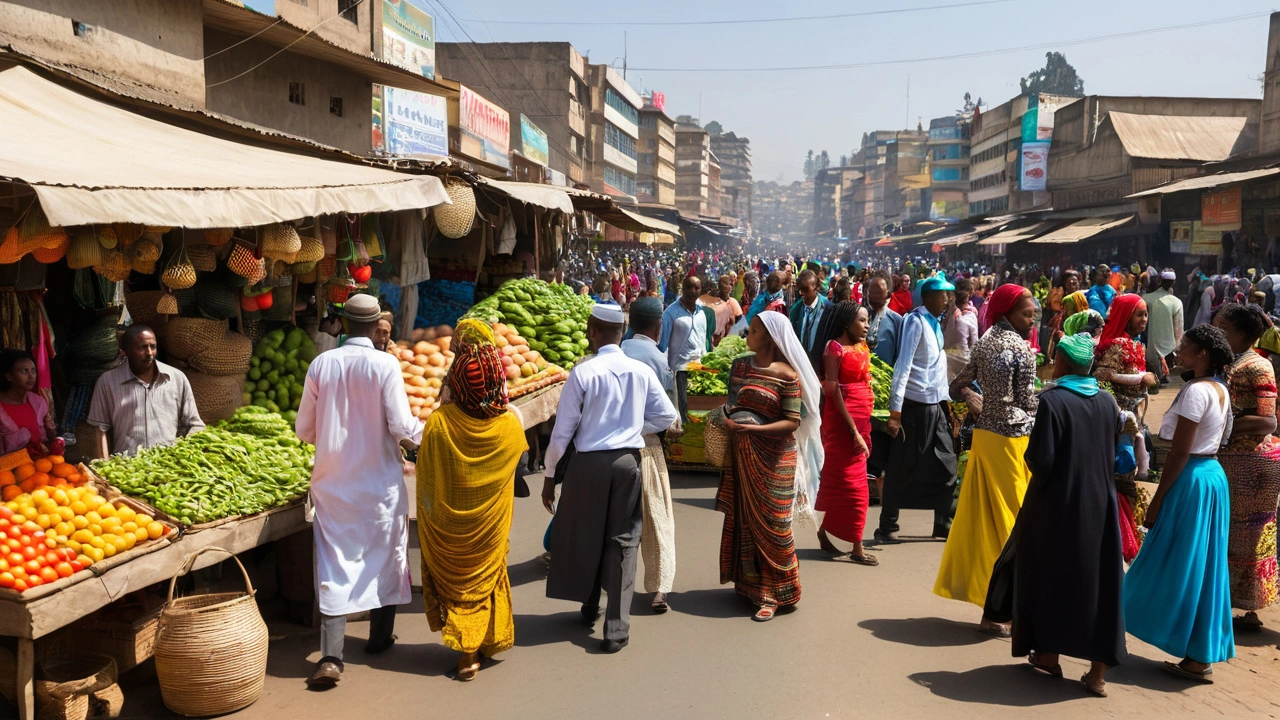
 The 7 Essential Occupations: A Deep Dive into Career Choices
The 7 Essential Occupations: A Deep Dive into Career Choices
 Exploring Ethiopian Cuisine: Dishes, Flavors, and Cooking Techniques
Exploring Ethiopian Cuisine: Dishes, Flavors, and Cooking Techniques
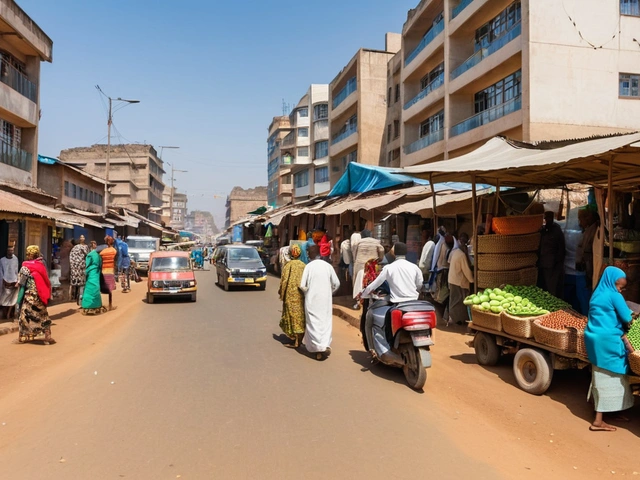 Cost of Living in Ethiopia: Your 2024 Guide
Cost of Living in Ethiopia: Your 2024 Guide
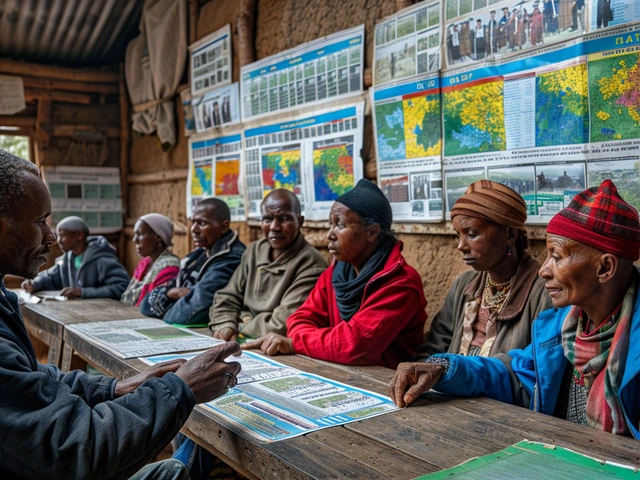 Exploring the 9 Core Areas of Occupation: A Comprehensive Guide
Exploring the 9 Core Areas of Occupation: A Comprehensive Guide
 What is the Average Salary of a Nurse in Ethiopia? Exploring Nursing Wages and Benefits
What is the Average Salary of a Nurse in Ethiopia? Exploring Nursing Wages and Benefits
Pauline Herrin
July 20, 2024 AT 17:41When contemplating relocation, it is prudent to verify the most recent visa regulations directly from the Ethiopian Ministry of Foreign Affairs, as the guide's information may be outdated. Additionally, one should consider the fiscal implications of dual taxation and consult a qualified accountant before finalizing any move.
pradeep kumar
July 21, 2024 AT 03:24The guide glosses over the bureaucratic delays that often plague work‑visa processing, which can extend beyond the advertised three‑day window.
love monster
July 21, 2024 AT 13:08From a relocation‑strategy perspective, integrating into Addis Ababa’s expatriate networks accelerates onboarding, especially when leveraging platforms like Slack channels for foreign professionals. Aligning your housing search with a reputable real‑estate broker reduces exposure to informal lease traps. Moreover, allocating a contingency budget of 15 % of monthly expenses mitigates unexpected utility surcharges. Engaging with local community events also enhances cultural fluency and professional rapport.
Christian Barthelt
July 21, 2024 AT 22:51Contrary to the claim that “electricity is cheap,” the average monthly bill for a two‑bedroom apartment often exceeds $120 due to frequent load‑shedding and reliance on generators. Moreover, the statement that “public transport costs just a few cents” neglects the additional fare for the light‑rail system, which is priced in Ethiopian birr and translates to roughly $0.30 per ride. These nuances warrant a more precise articulation.
Ify Okocha
July 22, 2024 AT 08:34The assertion that “healthcare is reasonable” disregards the disparity between private clinics and public hospitals, where out‑of‑pocket expenses can rival those in the United States for specialized procedures. Furthermore, the guide omits the necessity of obtaining comprehensive health insurance that covers expatriate expatriates, a critical oversight for any long‑term stay. The recommendation to rely on “local pharmacies” for prescription medication fails to account for differing pharmaceutical standards and potential counterfeit risk. One must also be aware that language barriers in medical settings can complicate diagnosis and treatment. Overall, the health section would benefit from a data‑driven risk assessment.
William Anderson
July 22, 2024 AT 18:18Honestly, the accommodation pricing chart reads like a fantasy novel-royal apartments for $1500 beside modest dwellings for $600, yet the narrative skips the middle‑class reality that most expatriates occupy. The guide’s enthusiasm feels forced, as if the author is auditioning for a travel documentary. Without a realistic budget template, readers are left bewildered. It’s a dramatized portrayal that lacks the gritty financial truth.
Sherri Gassaway
July 23, 2024 AT 04:01In contemplating the essence of “moving,” one must ask whether the shift is merely geographical or an existential migration of the self. The guide touches upon cultural rituals, yet it skirts the profound inner dialogue prompted by the coffee ceremony, a ritual that mirrors the brew of identity itself. Moreover, the subtle tension between communal obligations and individual autonomy remains unexplored, leaving a philosophical void. The narrative could benefit from examining how “Ethiopian time” reshapes personal temporality. By delving into the symbolism of shared injera, the author would illuminate the dialectic of nourishment and belonging. Ultimately, relocation is a dialectical synthesis of external environment and internal metamorphosis.
Milo Cado
July 23, 2024 AT 13:44Great job outlining the visa steps-this roadmap really simplifies the process! 🌟 Keep the momentum going, and soon you’ll be sipping Ethiopian coffee in a new home. ☕️
MONA RAMIDI
July 23, 2024 AT 23:28The cost‑of‑living section feels wildly optimistic, bordering on naive.
grace riehman
July 24, 2024 AT 09:11Youre gonna love the local markets-fresh fruits everywhere and the vibe is super friendly. Just remember to haggle a bit, it’s part of the fun!
Vinay Upadhyay
July 24, 2024 AT 18:54Oh, the “employment opportunities” paragraph is a masterpiece of optimism-because every tech graduate instantly lands a high‑paying job in Addis, right? In reality, the tech sector is still nascent, and positions often require extensive local experience. The guide’s rosy portrayal ignores the competitive grant processes for NGOs, which can stretch over months. One would be better served by a candid discussion of these bottlenecks.
Eve Alice Malik
July 25, 2024 AT 04:38I’m curious about how families adapt to school enrollment timelines, especially given the wide range of tuition costs across international and local options.
Debbie Billingsley
July 25, 2024 AT 14:21America’s citizens should recognize that moving abroad is not an escape from responsibility; contributing positively to Ethiopia’s development honors both nations.
Patrick Van den Berghe
July 26, 2024 AT 00:04Read the guide and note the visa steps then compare them with the official eVisa portal for any changes
Josephine Gardiner
July 26, 2024 AT 09:48It is commendable that the author has assembled a comprehensive overview of relocation logistics pertaining to Ethiopia. Nevertheless, a more rigorous citation of governmental sources would augment the credibility of the visa and residency sections. Additionally, an analytical comparison of cost‑of‑living indices between Addis Ababa and major U.S. metropolitan areas would furnish prospective expatriates with a quantifiable benchmark. The treatment of cultural adaptation, while informative, could be enriched by incorporating anthropological insights on regional customs. In sum, the guide serves as a valuable primer, yet it invites further scholarly refinement.
Jordan Fields
July 26, 2024 AT 19:31The guide omits the requirement for a recent passport photo; this oversight should be corrected.
Divyaa Patel
July 27, 2024 AT 05:14Embarking on the odyssey to Ethiopia is akin to stepping onto a vibrant tapestry woven with ancient threads and modern ambition. The guide, while earnest, occasionally drifts into the realm of romanticized fantasy, painting the capital as a perpetual carnival of culture. First, the visa procedure is not a breezy stroll; applicants must navigate bureaucratic mazes that can swallow weeks of anticipation. Second, the cost‑of‑living narrative glosses over hidden fees, such as utility surcharges that surface during the rainy season. Third, accommodation hunting demands a savvy understanding of local landlord customs, which the guide barely scratches. Fourth, the celebrated coffee ceremony is not merely a tourist spectacle but a solemn ritual demanding respect and patience. Fifth, “Ethiopian time” redefines punctuality, often stretching the hour beyond its conventional bounds. Sixth, health insurance is not optional; without it, expatriates risk exorbitant medical bills. Seventh, teaching positions in international schools require certification that the guide fails to enumerate. Eighth, the tech sector, though burgeoning, still contends with infrastructural challenges that can frustrate even the most resilient coder. Ninth, navigating public transportation necessitates fluency in local routes and an acceptance of occasional overcrowding. Tenth, language barriers persist, and mastering Amharic basics can make the difference between inclusion and isolation. Eleventh, security considerations, while generally manageable, demand vigilance in crowded markets. Twelfth, legal residency renewals impose strict timelines that cannot be ignored. Thirteenth, cultural integration thrives on participation in communal festivals, an experience the guide only briefly mentions. Fourteenth, the emotional journey of leaving familiar shores is profound and deserves more compassionate guidance. Fifteenth, ultimately, prospective movers should supplement this guide with firsthand testimonies to paint a fuller, more authentic portrait of Ethiopian life.